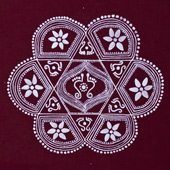Design Resource
Aipan - Uttarakhand
Ritual Floor Painting
by
Aipan is a traditional folk art specifically made by women of Uttarakhand. This art is done on the floor over a brick red background with a white paste made out of rice flour. The typical art is done on all special occasions and household ceremonies and rituals Viz. Ganesh Chaturthi, Makara Sankranti, Kark Sankranti, Initiation ceremonies, Weddings, Shivaratri and Laxmi puja. It is believed that these motifs evoke divine power which brings good fortune and wards off evil.
Though the art form is practiced in different parts of India and called by various names, Uttarakhand Aipan painting has its unique identity which is always done on empty walls and on the ground over a brick red background which is a symbol of fortune and fertility.
The art form is used to decorate floors and walls at the Puja room (place of worship) and the entrance of homes and practiced by many other communities of different regions. Aipan art has different names in different parts of India.
Names of the Art in different states:
• Aipan in Uttarakhand
• Alpona in Bengal and Assam
• Aripana in Bihar and Uttar Pradesh
• Mandana Rajasthan and Madhya Pradesh
• Rangoli in Gujarat and Maharashtra
• Kolam in South
• Muggu in Andhra Pradesh
• Alpana, Chita, Jhoti and Muruja in Odisha.
Aipan in Uttarakhand:
The place Uttarakhand, formerly Uttaranchal, is a state in the northern hemisphere of India. It is a part of the Himalayan range that starts from the Shivalik foothills and stretches to the greater Himalayas.
Uttarakhand has a rich diversity of languages including Hindi, Kumaoni, Garhwali, Jaunsari, and Bhotiya. It is a beautiful state with a treasure of Arts and Crafts heritage and second to no other state in the country. It has its own individuality in temple architecture, painting, jewellery making, wood carving, candle making, and also in the performing arts like dance and music. The famous crafts here are cultural windows and doors, woollen rugs and carpets, copper utensils, bamboo baskets, and folk art like Aipan taken from the Sanskrit word “Lepana” (means doing Plaster).
References:
Handicrafts of India
Handmade in India
Craft Atlas of India - Jaya Jaitly
Crafts Traditions of the World











